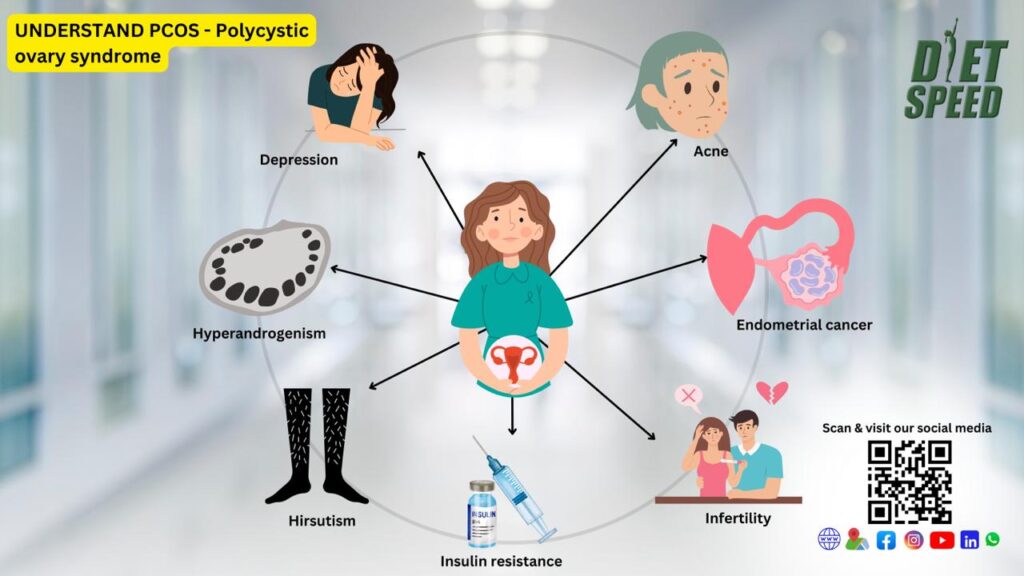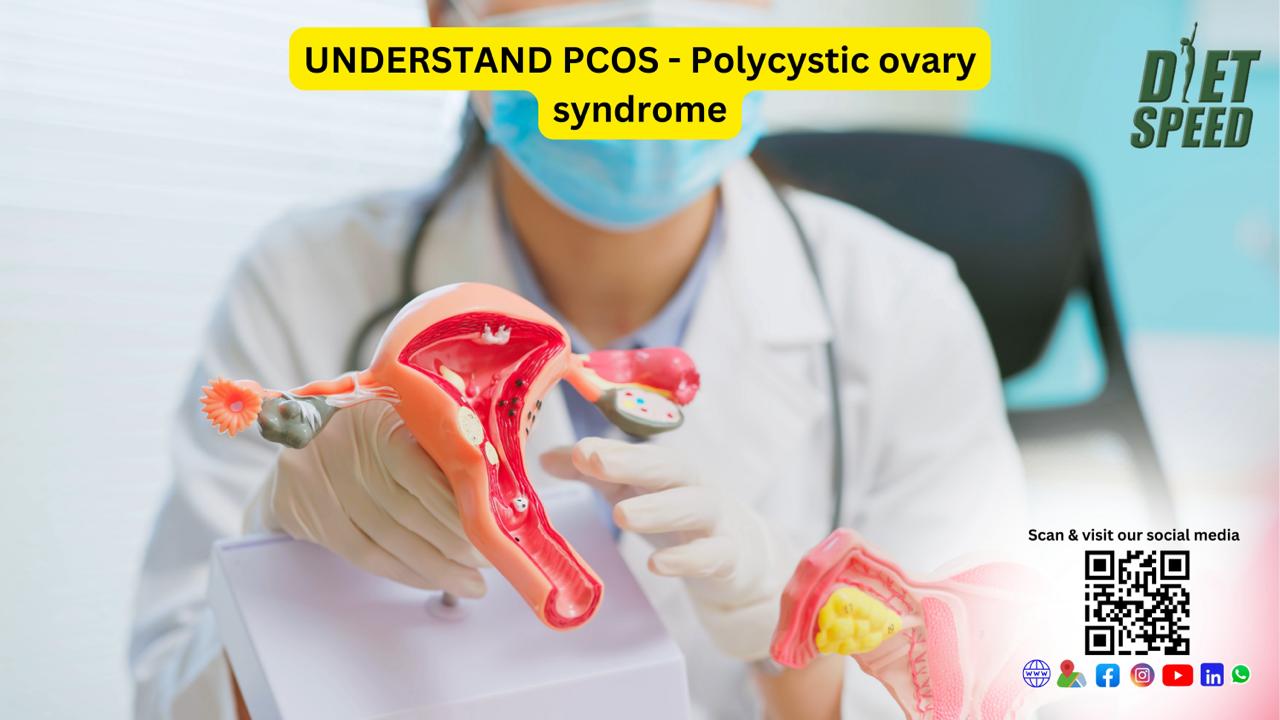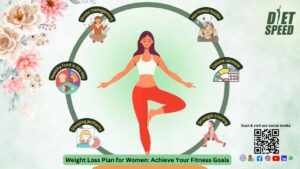What if we say PCOS is beyond Polycystic Ovary or excessive levels of androgens in the female body? What if we say that even if PCOS can’t be cured, its symptoms could be managed? What if we say you have a safe space where you can come and we can help you manage your symptoms?
PCOS or Polycystic Ovary Syndrome is a lifestyle disease and a metabolic condition. In PCOS the ovaries produce an abnormal amount of androgens (male sex hormone) which are usually present in women but in smaller amounts.
PCOS has been a problem for centuries. Going deep into philosophy, it has existed since ancient times. Hippocrates discovered that women had symptoms of irregular menstrual cycles and infertility. In the 19th century, doctors began to note these symptoms and associate them with PCOS. The condition was identified in 1935 by American Gynecologists Irving Stein and Michael Leventhal. They linked it to many ovarian cysts, irregular periods, and infertility. Due to this, it was also named as Stein-Leventhal Syndrome. The late 20th century made PCOS closely associated with insulin resistance, hormonal imbalances, and increased androgen levels or male hormone levels. Now PCOS is regarded as a lifestyle and an endocrine disorder. It is explained to have genetic, hormonal, and environmental factors affecting it. It impacts a woman’s reproductive health. And is associated with risks like type 2 diabetes, cardiovascular diseases, and more complications.
Polycystic Ovary Syndrome is a problem with hormones happening in the reproductive years while PCOS and fertility issues can occur in adulthood. Small cysts or small sacs of fluid form on the outer edge of the ovaries in large amounts. Now this condition differs from woman to woman, as some might have it and some might not. These cysts contain immature eggs called follicles and the follicles fail to release eggs regularly. Let’s understand it from the beginning and the basics since PCOS and ovulation are related. We are aware that ovulation is the release of an egg each month that is supposed to be fertilized by the male sperm. Ovulation is controlled by follicle-stimulating hormone (FSH) and Luteinizing Hormone (LH). They are produced in the pituitary gland. FSH stimulates the ovary to produce a follicle and LH triggers the ovary to release a mature egg.
Now the catch is how all this is related to PCOS or Polycystic Ovaries. Let us understand how cysts are formed and how the androgen levels increase in women. We know that ovulation occurs when a mature egg is released from an ovary. Now when the egg is released, it is released to be fertilized by a male sperm. If the egg is not fertilized it is sent out of the woman’s body during their period. Now there are cases when a woman doesn’t make enough of the hormones needed to ovulate. When this ovulation does not happen it is when the ovaries develop small cysts and these cysts make androgen hormones. Women suffering from PCOS often have high levels of androgen and have problems related to the menstrual cycle. With these, there are many other symptoms as well.
There are cases and instances where you can have PCOS and have no symptoms. This realization strikes like thunder when a woman tries to get pregnant or starts gaining weight because of unknown reasons. There have been cases of mild PCOS where the symptoms are not too severe for you to notice. Around 70% of cases like these go undiagnosed and women are left in the dark without knowing what is going on with them.
But, what if we tell you that you are not alone? There are so many women out there who are suffering from PCOS. PCOS was first discovered by Italian Physician Antonio Vallisneri in 1721. And after that, enough research has supported how common a problem Polycystic Ovaries are in females. The World Health Organisation or WHO says that PCOS affects an estimated 8% to 13% of reproductive-aged women (15 to 44 years old).
Everywhere around us the frequency and the intensity of the problem can be seen ever increasing. PCOS can happen to anyone regardless of their caste or race and anytime after puberty or in your 20s and 30s when the woman is trying to get pregnant
Diversity is everywhere around us and what if we tell you that it is different for every woman going through PCOS as well? No, it is not that complicated and not intimidating. Yet needs to be understood for managing PCOS.

Problems faced by a woman during PCOS
PCOS might be a problem involving physical symptoms majorly but it affects a woman in various ways. Some of the ways are:
- Emotional troubles – irregular periods, fertility challenges, and hormonal imbalances can be emotionally upsetting. This paves the way for anxiety, depression, and stress.
- Body image issues – hirsutism or excessive body hair and weight gain can impact the self-esteem and body image of a woman. She might feel conscious and underconfident.
- Fertility issues – women with PCOS might face difficulties in conceiving. The emotional journey she goes through while trying to get pregnant and numerous treatments is emotionally overwhelming. Disappointments and sadness prevail for some time.
- Social connections – PCOS might as well affect relations, interactions, and intimacy. Since explaining your symptoms to others and dealing with taboos can be troublesome.
- Long-term complications – there is always a worry related to the increased risk of certain other conditions. Like diabetes, heart problems, or endometrial cancer.
- Lifestyle adjustments – switching to a completely new lifestyle to help oneself get better is not easy and requires support and effort. This might not be possible for some women who either live alone or have an unsupportive social network.
PCOS Causes
That was a lot of information, but what if we say that PCOS causes are still not well known? Of course, there are genetic and environmental factors that lead one to PCOS.
- Genetic factors of PCOS explain that it runs in the family, and there are cases of the patient’s mother or sisters having PCOS.
- Obesity and lifestyle patterns are significant factors in paving a path for PCOS.
- Insulin resistance is when the body resists insulin and can’t use insulin well. When the insulin levels are increased the chances of androgen levels to increase are also higher. This is seen evidently when we grow to find dark and velvety patches of skin on the lower part of the neck, armpits, groin, or under the breasts.
- Low Grade Inflammation is the WBCs response to any infection, threat, or injury. Research states that women with PCOS have long-term Low Grade Inflammation which leads to Polycystic Ovaries which produce androgen. They end up making a chain of heart problems and issues related to blood vessels.
PCOS Symptoms
Are you gaining weight all of a sudden and everyone blames it on your eating habits? Have you had sleeping problems and everyone blames it on your phone usage? Well, those might not be the case and PCOS symptoms might be.
PCOS symptoms can be identified with the following, check for them and if you relate to either, consider consulting a specialist.
- Irregular periods or missed periods
- Large and many cysts in the ovaries
- Excessive body hair on the chest, stomach, and back. Also called Hirsutism.
- Weight gain specifically in the abdomen or belly area which is often regarded as PCOS belly
- Acne
- Oily skin
- Hair fall, which is also regarded as Alopecia
- Infertility
- Skin tags which are the excessive skin on the neck or armpit area
- Pigmentation called acanthosis nigricans is found on the back of the neck, armpits, and under the breasts
- Facial hair
- Obesity which is regarded as the causing factor and symptom of PCOS
- Weight problems and inability to lose weight easily
- Polycystic ovaries
- Mood changes
Diagnosing PCOS
Before going to any specialist, there is always a sense of fear and anxiety about what they will ask or do to us. Diagnosing PCOS is simple yet comprehensive.
Your medical history and symptoms would be asked, post which you would be required to explain whatever difference you feel in your body. The doctor might as well suggest a pelvic exam to check your reproductive organs (inside and outside of your body).
Ultrasound is a widely used technique for the diagnosis of PCOS which helps in checking the size of ovaries and if at all they have any cysts.
Blood tests help in monitoring the levels of androgens and other hormones. Your blood glucose levels along with cholesterol and triglyceride levels are checked as well.
The following are the major symptoms of PCOS that you will be checked upon initially:
- Irregular periods
- Acne
- Excessive facial hair or body hair
- Higher levels of androgen
- Polycystic ovaries
PCOS Treatment
What next? How is everything done? How do we proceed ahead in treating the problem? This is the place where you would be advised of a thousand different types of diet plans, various workouts, gym and weight training, or yoga and dance. Probably everyone around you would have a different approach to PCOS treatment. No wonder diet and physical activity are preliminary in treating PCOS. But that is not the only thing since PCOS is a lifestyle condition and nothing changes if your lifestyle doesn’t. So, get up, and go for a run. Have a good night’s sleep. Eat healthy and don’t feel inferior because you aren’t alone in this journey and of course, you already got us.
Since PCOS is a problem that requires critical treatment, it also requires a team of specialists to address the issue more properly. An endocrinologist would work to check your hormonal levels. While a dietician would prepare diets that are suited to your body and a psychologist keeps in check your mental health. A gynecologist would work towards managing the symptoms and regulating your period cycle.
The following are some PCOS treatment ideas for you to consider when you choose to make a change:
- A well-balanced and healthy diet is required which does not mean that we can start with any popular diet being provided on the internet. It is very important to make a diet that is personalized for us
- Physical activity
- Birth control pills
- Diabetes medication like metformin
- Treatment of other symptoms like hair fall and acne
- Lifestyle changes
- Improved sleeping habits, aim for 7 to 8 hours of sound and hygienic sleep
- Androgens blocking medications
- Progestin therapy is a hormonal treatment that is used to treat menstrual cycles and manage symptoms of PCOS
- Limiting caffeine as excessive caffeine can worsen hormonal imbalances and increase stress
- Reducing stress
- Avoiding endocrine disruptors. For instance, chemical compounds either natural or synthetic. They disrupt the endocrine activity like plastics, pharmaceuticals, or cosmetic products.
- Acupuncture
- Spearmint tea helps in increasing the Luteinizing Hormone (LH) and Follicle Stimulating Hormone (FSH). They help in regulating the menstrual cycle
If the goal is to get pregnant you may also try In-vitro Fertilization and medications that cause ovulation.
Complications
PCOS is a problem in itself which might as well act as a trigger for other problems to happen. But prevention has always been better than cure. Lookout for the symptoms of PCOS timely as it can bring complications like these in your life ahead:
- Type 2 diabetes, also known as prediabetes
- High Blood Pressure or hypertension
- Heart problems
- Uterine cancer
- Fertility issues
- Gestational diabetes or pregnancy-induced High Blood Pressure
- Miscarriage or premature birth which is the delivery of the baby before 37 weeks of pregnancy can lead to serious complications for the baby
- Serious liver inflammation caused by fat buildup in the liver
- Metabolic syndrome includes a lot of conditions like insulin resistance, cardiovascular diseases, and high blood pressure
- Sleep apnea
- Depression
- Anxiety
- Eating disorders
Conclusion
PCOS is not threatening but it requires you to take action to reverse your PCOS and its symptoms. There is no such thing as a PCOS cure but the effects and symptoms may change over time and can be managed. so you eventually become less aware of it. But it doesn’t mean we would not get up and take everything in our hands. With so much information and so many suggestions, it is understandable for anyone to be confused and probably confused as well. PCOS doesn’t affect one physically. It is not only about PCOS and weight gain but also how to manage the weight. It equally affects your mental and social health and impacts your health wholly. But there is always room for improvement. So, if not now then when. Change your dietary and sleeping habits. Aim for sleeping 7 to 8 hours and not 4 to 5 hours and not post 2 am. Changes happen and are visible when we choose them to be visible.




